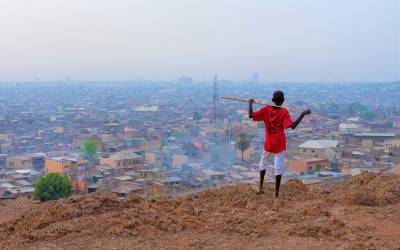Lancet Nigeria Commission report calls for ‘One nation, one health’ | UCL News – UCL – University College London

UCL News
16 March 2022
A landmark UCL-led report studying health inequality in Nigeria has called for urgent action by policy makers to prevent diseases before they occur and to urgently increase access to health care for all.
The Lancet Nigeria Commission report, published on Wednesday 16 March, found that health outcomes remain poor in Nigeria despite higher expenditure since 2001.
A multidisciplinary group of Nigeria experts and academics based around the world, working in close collaboration with UCL’s Institute for Global Health and policy makers, over a two-year period reviewed existing disease burden, and opportunities to improve health. The team found that while Nigeria is Africa’s largest economy and most populous country – projected to become the world’s third most populated country by 2050 – its dismal health outcomes are holding back progress and threatening the future of an otherwise dynamic nation.
In an accompanying Lancet paper, the group also examined population health outcomes in Nigeria between 1998-2019, compared to 15 other west African countries. They analysed by gender patterns of mortality, years of life lost, years lived with disability, life expectancy, healthy life expectancy, and health system coverage. The authors concluded that Nigeria compares less favourably than similar nations in West Africa, despite recent improvements.
Professor Ibrahim Abubakar (UCL Institute for Global Health), who led the Commission, said: “Nigeria urgently needs to improve access to health care by improving health financing and the efficiency of existing spending. Our report offers specific recommendations on innovation financing and specific interventions to improve healthcare staffing, information systems and access to care for all.
“Given that the vast majority of factors that influence health lie outside the healthcare sector, health should be at the heart of all policies. This will require a re-think of governance for health with the establishment of intersectoral governance mechanisms that enable measurement of the health impact of different policies to hold all sectors accountable.
“This includes addressing poor access to water and sanitation; improving access to healthy foods addressing the double burden of malnutrition due to underweight and overweight; and tackling the health impacts of climate change, including air pollution. An explicit consideration of equity in the implementation of programmes and provision of social welfare, education and employment opportunities should be paramount.”
Yet the report presents a positive outlook that Nigeria can deliver equitable and optimal health outcomes.
It identifies bold recommendations for action in collaboration with policy makers, contributing to sustainable change on health policy and programming, national health outcomes and global health goals.
The report’s recommendations include:
The Commissioners suggest that measures could be taken to substantially improve population health, including targeted interventions to tackle unsafe water sources, poor sanitation, malnutrition, and exposure to air pollution.
An urgent goal of the Nigerian government should be to rebalance prevention and curative care to improve the health of young people, the team says. Priorities include improving access to water and sanitation and to education – particularly for women and girls – as well as adopting policies to promote environmental sustainability to reduce air pollution and to create a healthier built environment.
They call for re-positioning future policy to achieve Universal Health Coverage.
Professor Abubakar added: “Health is a unique political lever, which to date has been under-utilised as a mechanism to rally populations. Good health can be at the core of the rebirth of a patriotic national identity and sense of belonging.
“A commitment to a ‘One Nation, One Health’ policy would prioritise the attainment of Universal Health Coverage for all, particularly for the most vulnerable Nigerians, who bear an unacceptably high disease burden.”
The report combines analysis of demographic dynamics, disease burden and future projections based on data available from the Global Burden of Disease study, the Nigerian National Bureau of Statistics, and the Nigeria Centre for Disease Control.
Other partners include University of Ibadan, University of Nigeria, Bayero University Kano/Aminu Kano Teaching Hospital, and Ondo State University of Medical Sciences.
Credit: Lancet Nigeria Commission
Tel: +44 (0)20 3108 7787
Email: s.vinter [at] ucl.ac.uk







